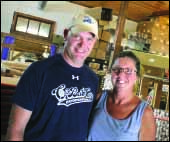Cooperstown Bat Uses Wood Twice
– For Its Product, And To Heat Plant
By LIBBY CUDMORE • AllOTSEGO

Waste not, want not is how Tim and Connie Haney see it. “We’ve paid for the wood,” said Connie. “We might as well use it.”
The owners of the Cooperstown Bat Company will tell two-thirds of the wood used in making their custom bats gets turned into sawdust.
But that doesn’t mean it can’t be useful.
After two brutally cold winters in their factory in the former Hartwick depot, in 2011 the Haneys installed an LEI Bio-Burner to turn waste materials to warmth. “We were spending $5,000 a winter on propane,” said Tim. “The $10,000 we’ve saved so far has already paid for itself.”
“Sometimes it gets too hot; then we just open the doors!” added Connie.
The Haneys make 30,000 bats a year, and collect the sawdust year ’round, funneling it through an exhaust system into a silo behind the factory. “We fill that silo four times a year,” Tim said. “That’s 11 tons each time.”
The sawdust, made from maple, ash and yellow birch of the custom-designed bats, heats their entire factory. And although the combination isn’t ideal for the burner – “it’s a little dry,” said Tim – he is working with LEI to design a system more capable of handling a variety of biomass, from grass pellets to sawdust and wood chips.
“There’s so much wasted wood in this community,” he said. “And it’s a very cheap, renewable replacement for oil.”
Now, they’re hoping to share their good fortune with the community.
Tuesday, Sept. 23, Martha Clarvoe, who chairs the Town of Hartwick’s Conservation Advisory Committee, organized an open house at the factory for the public to see the Bio-Burner in action and discuss Hartwick’s recent pledge to join the state’s Climate Smart Communities, a program sponsored by the Department of Environmental Conservation.“We’re interested in being more sustainable,” she said. “We wrote a pledge and we signed it.”
The pledge includes an energy audit of all town buildings, pumps and vehicles to reduce energy usage. Hartwick joins the Village of Cooperstown and Town of Otsego – they also took the Climate Smart pledge – in seeking sustainable alternatives to oil and other fossil fuels. “We’re looking at all the ways to become more sustainable,” she said. “Whether that’s switching to compact florescent bulbs, using public transport or building bike paths.”
But one of the topics of conversation is possibly using the Cooperstown Bat Co.’s fuel to heat public buildings. “We could make this community self-sufficient,” said Tim. “We are on the cusp of that.”
It would require an immense undertaking, Tim said, digging ditches to set up connecting pipes throughout the town, but it’s not an unreachable goal.
“Somebody has to start,” he said. “We decided we would step up and make and investment. We’re on the cusp of this.”

